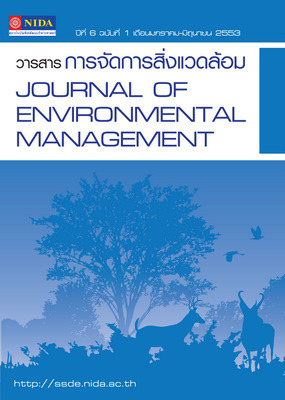การจัดการน้ำแบบรัฐและแบบชาวบ้านในพื้นที่ตำบลกาเยาะมาตี อำเภอบาเจาะ จังหวัดนราธิวาส/Water Management by Government and Local Community in Gayohmati Subdistrict, Bacho District, Narathiwat Province
บทคัดย่อ
การ วิจัยนี้ศึกษาระบบการจัดการน้ำและนำเสนอแนวทางการจัดการน้ำซึ่งอาศัย ภูมิปัญญาท้องถิ่นจัดการบนพื้นฐานของการมีส่วนร่วมของประชาชน กรณีศึกษาฝายทดน้ำของชุมชนกาเยาะมาตี พบว่า มีการบริหารจัดการน้ำผ่านกระบวนการการมีส่วนร่วมของคนในชุมชนมานานกว่า 50 ปี โดยอาศัยภูมิปัญญาท้องถิ่นบูรณาการองค์ความรู้ในการบริหารจัดการน้ำ ด้วยการจัดระบบการลงทุน การก่อสร้าง การจัดสรรผลประโยชน์และการบำรุงดูแลรักษา ฝายทดน้ำจึงสามารถอำนวยประโยชน์ให้แก่ชุมชนมาจนถึงทุกวันนี้โดยปราศจากความ ขัดแย้ง เปรียบเทียบกับ กรณีการขุดคลองบาเจาะเพื่อแก้ไขปัญหาน้ำท่วมขังในตัวเมืองบาเจาะโดยหน่วยงาน รัฐ ซึ่งไม่ได้ศึกษาผลกระทบหรือสอบถามความคิดเห็นจากชาวบ้าน ได้สร้างความเสียหาย ทั้งในเชิงเศรษฐกิจ สังคม และสิ่งแวดล้อมต่อชุมชนอย่างรุนแรง โดยเฉพาะผู้ที่อาศัยน้ำเพื่อการปลูกข้าว จากกลุ่มตัวอย่างจำนวน 300 ครัวเรือน พบว่า ประชาชนต้องการมีส่วนร่วมในการจัดการน้ำสูงถึงร้อยละ 92 โดยมากกว่าครึ่งหนึ่ง (ร้อยละ 52.7)
This research is aimed to study a water management system and suggest appropriate ways for water management, which is based on local wisdom and operated by community participation in Saiburi watershed area. The findings showed that the Gayohmati community has utilized a community-led water management method for over 50 years. Through the integration of local wisdom and knowledge in water management, investment system, construction, allocation, and maintenance, the Gayohmati community has effectively operated the dam for their benefits without any conflict. Comparative case study with the government’s digging project of the Bacho Canal to solve the flood problem in Bacho revealed that the project has caused severe economic, social and environmental damages to the community, especially to the farmers who need water for their rice plantation. This is due to the lack of the study of the project drawbacks and of the survey of public opinions about the project. According to the study of 300 household samples, 92% expressed the need to take part in water management, and more than half of the samples (52.7%)



